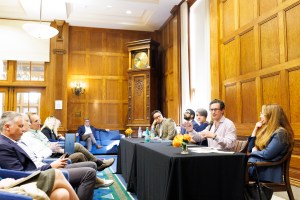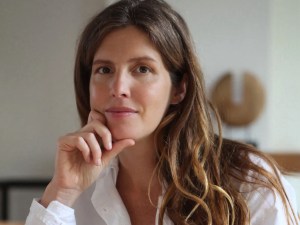Harvard researchers selected for National Academy of Sciences membership
Three women, five men recognized for accomplishments
Eight Harvard faculty members this week were elected to membership in the National Academy of Sciences in recognition of their distinguished and continuing achievements in original research.
The three women and five men selected – who make up more than 10 percent of this year’s total group of honorees – are physicist Lisa J. Randall, pathologist Anjana J. Rao, political scientist Theda Skocpol, chemist Eric N. Jacobsen, neurologist Michael E. Greenberg, health care policy researcher Ronald C. Kessler, Lars E. Hemquist of the Harvard-Smithsonian Center for Astrophysics, and developmental biologist Gary Ruvkun.
The National Academy of Sciences is a private organization of scientists and engineers dedicated to the advancement of science and its use for the general welfare. It was established in 1863 by a Congressional Act of incorporation signed by Abraham Lincoln that calls on the Academy to act as an official adviser to the federal government, upon request, in any matter of science or technology.
Michael E. Greenberg is a Professor of Neurology and Neurobiology at Harvard Medical School and director of the division of neuroscience at Children’s Hospital Boston. Greenberg is interested in the identification of a genetic program that is activated by neuronal activity, the mechanism of signal transduction that carries this signal from the membrane to the nucleus, and the identification of regulators of this experience-dependent process that affect synapse development, refinement and plasticity.
Lars E. Hernquist is a professor at the Harvard-Smithsonian Center for Astrophysics. His recent research topics include the cosmological framework for the co-evolution of quasars, supermassive black holes, and elliptical galaxies, and the origin of dynamically cold rings around the Milky Way.
Eric N. Jacobsen is the Sheldon Emery Professor of Chemistry of the Department of Chemistry and Chemical Biology at Harvard University. His research interests are in selective catalysis, especially in the design, discovery, and study of systems that mediate fundamentally interesting and useful organic reactions.
Ronald C. Kessler is a professor of the Department of Health Care Policy at Harvard Medical School. He is the principal investigator of the National Comorbidity Survey, the first nationally representative survey of the prevalence and correlates of psychiatric disorders in the United States.
Lisa J. Randall is a professor of theoretical physics in the Department of Physics at Harvard University. She studies particle physics and cosmology, researching elementary particles and fundamental forces. Recent studies involve studying models of the extra dimensions of space.
Anjana J. Rao is a Professor of Pathology and senior investigator at the Immune Disease Institute of Harvard Medical School. Her lab studies the mechanisms by which T cells turn on genes when they respond to foreign antigens. When the body encounters foreign or pathogenic entities such as bacteria, viruses, cancer cells, or transplanted organs (collectively known as antigens), it responds with a powerful defensive reaction known as the immune response.
Gary Ruvkun
is a Harvard Medical School Professor of Genetics, whose Massachusetts
General Hospital laboratory uses the molecular genetics of a form of
round worm to study problems in gene regulation, developmental biology
and physiology.
Theda Skocpol, former Dean of the Graduate School of Arts and Sciences, is Victor S. Thomas Professor of Government and Sociology at Harvard. Her research has focused on development of U.S. social policies, including Social Security and health insurance, comparative political institutions, and most recently on issues related to civic engagement, voluntary associations, and interest groups in American democracy.





